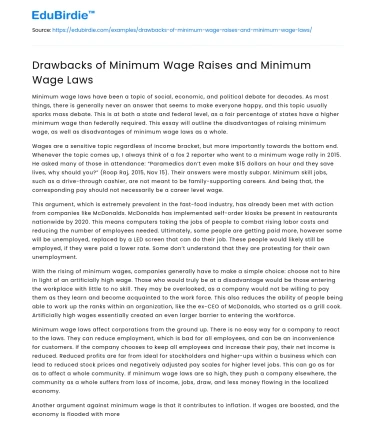Minimum wage laws have been a topic of social, economic, and political debate for decades. As most things, there is generally never an answer that seems to make everyone happy, and this topic usually sparks mass debate. This is at both a state and federal level, as a fair percentage of states have a higher minimum wage than federally required. This essay will outline the disadvantages of raising minimum wage, as well as disadvantages of minimum wage laws as a whole.
Wages are a sensitive topic regardless of income bracket, but more importantly towards the bottom end. Whenever the topic comes up, I always think of a fox 2 reporter who went to a minimum wage rally in 2015. He asked many of those in attendance: “Paramedics don’t even make $15 dollars an hour and they save lives, why should you?” (Roop Raj, 2015, Nov 15). Their answers were mostly subpar. Minimum skill jobs, such as a drive-through cashier, are not meant to be family-supporting careers. And being that, the corresponding pay should not necessarily be a career level wage.
Save your time!
We can take care of your essay
- Proper editing and formatting
- Free revision, title page, and bibliography
- Flexible prices and money-back guarantee
This argument, which is extremely prevalent in the fast-food industry, has already been met with action from companies like McDonalds. McDonalds has implemented self-order kiosks be present in restaurants nationwide by 2020. This means computers taking the jobs of people to combat rising labor costs and reducing the number of employees needed. Ultimately, some people are getting paid more, however some will be unemployed, replaced by a LED screen that can do their job. These people would likely still be employed, if they were paid a lower rate. Some don’t understand that they are protesting for their own unemployment.
With the rising of minimum wages, companies generally have to make a simple choice: choose not to hire in light of an artificially high wage. Those who would truly be at a disadvantage would be those entering the workplace with little to no skill. They may be overlooked, as a company would not be willing to pay them as they learn and become acquainted to the work force. This also reduces the ability of people being able to work up the ranks within an organization, like the ex-CEO of McDonalds, who started as a grill cook. Artificially high wages essentially created an even larger barrier to entering the workforce.
Minimum wage laws affect corporations from the ground up. There is no easy way for a company to react to the laws. They can reduce employment, which is bad for all employees, and can be an inconvenience for customers. If the company chooses to keep all employees and increase their pay, their net income is reduced. Reduced profits are far from ideal for stockholders and higher-ups within a business which can lead to reduced stock prices and negatively adjusted pay scales for higher level jobs. This can go as far as to affect a whole community. If minimum wage laws are so high, they push a company elsewhere, the community as a whole suffers from loss of income, jobs, draw, and less money flowing in the localized economy.
Another argument against minimum wage is that it contributes to inflation. If wages are boosted, and the economy is flooded with more spending money, prices go up. To adjust for the new found flow of money everything increases, everything from the dollar menu to prices of new cars. The effects of artificially inflating wages, would come full circle, and essentially correct any benefits the higher minimum wage may have. Their living expense would increase as the wages increased, so all that would be accomplished would be raising inflation, and cost of living.
Additional effects of these raised wages would be adverse effects on America’s body of small business. With the total number of small businesses in the US declining, a raised minimum wage would be one of the final nails in the coffin. Many companies simply cannot afford to pay their employees an extremely high rate for an entry level job. With gross income of these business being so small, there isn’t that much money to be playing with when it comes to entire salaries.
This obscure idea that every wage is intended to support a household is, frankly, illogical. Minimum skill jobs with minimum skill pay are not meant to build entire adult lives on, and they shouldn’t. You can earn more money by acquiring skills in that workforce and becoming a more valuable employee. The idea of pay capable of supporting one’s entire life, with a job a high schooler or a computer could do, seems entirely arbitrary. You get paid for the level of craft. Not to mention that there’s people who would benefit from being able to sell their time/services for less than minimum wage.
Although there are both benefits and negatives from minimum wage laws, the negatives outweigh the advantages. They could potentially affect every single level within a company, as well as the community around it. In very practical terms, labor is the means of survival. Labor is worth the quality, effort and skill, and minimum wage laws skew that idea.






 Stuck on your essay?
Stuck on your essay?

